 Traveling through this marvelous journey we call life, we constantly seek happiness, success and meaning to affirm our existence on this planet.
Traveling through this marvelous journey we call life, we constantly seek happiness, success and meaning to affirm our existence on this planet.
Sometimes we find answers to our questions and frequently the replies lead us to yet more uncertainty. Life is a series of moments; some we consider “positive” and others we deem “negative.” We attempt to increase the “positive” moments while diminishing the “negative.”
If everything were so easy, we would get to the end of life and do the math. More “positive” than “negative” moments would indicate a plentiful life. Measuring life is not that easy. Life cannot be put into a box and be categorized as “good” or “bad” based simply on the sum of each of these experiences.
A life measured in “good” and “bad” assures frustration and fatigue. Is it realistic to believe that each moment which awaits us will be free of negativity? The answer is a resolute NO.
Deception and disgust will certainly cross our paths. We have loved ones who will leave the world we know and enter a reality yet unknown. There will be trials and tribulations with work, friends and people we have not yet met. This is not being negative; it is being realistic with our expectations.
 If we wait for everything to be beautiful, bright and bountiful during our adventure, we will likely be disillusioned with our destiny. If we accept unfortunate events as a given, we can consider our reactions, responses and reflections rather than the significance of the events themselves.
If we wait for everything to be beautiful, bright and bountiful during our adventure, we will likely be disillusioned with our destiny. If we accept unfortunate events as a given, we can consider our reactions, responses and reflections rather than the significance of the events themselves.
Charles Swindoll proposes the following:
“We are all faced with a series of great opportunities brilliantly disguised as impossible situations.”
 Life is the sum of all experiences. Any moment, be it “good” or “bad” can be a magical moment. What matters most is our perspective of each situation and what we learn from it. A friend told me recently, “The times when I was in the greatest pain, tribulation, and fear… those were the times I learned the most, changed the most, and became more of who I am.”
Life is the sum of all experiences. Any moment, be it “good” or “bad” can be a magical moment. What matters most is our perspective of each situation and what we learn from it. A friend told me recently, “The times when I was in the greatest pain, tribulation, and fear… those were the times I learned the most, changed the most, and became more of who I am.”
Directing our thoughts toward learning in turbulent times as well as in marvelous moments of excitement and ecstasy allows us to reflect upon a plentiful and productive lifetime complete with endless magical moments.
It’s the Bounce that Counts!
∞ Rob McBride ∞
LL I 36




 / Faro de
/ Faro de  Podemos potenciar nuestro poder personal con el pensamiento. La experiencia de cada individuo determina el grado de confianza que se tiene y el poder personal impulsa el logro de sus objetivos.
Podemos potenciar nuestro poder personal con el pensamiento. La experiencia de cada individuo determina el grado de confianza que se tiene y el poder personal impulsa el logro de sus objetivos. Platón dijo:
Platón dijo: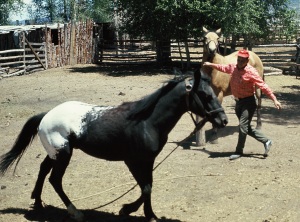 Cuando dejamos sueltas las riendas del pensamiento y nuestras emociones toman control del camino, somos pasajeros en vez de conductores de nuestro destino. Para tomar control de nuestra dirección podemos cambiar nuestra forma de pensar hacia las circunstancias que se cruzan en nuestro camino constantemente. Si pensamos en que los acontecimientos son obstáculos inhibiéndonos el paso, quedaremos estancados. Al contrario si pensamos en lo ocurrido como un evento natural, conseguiremos soluciones definidas a los desafíos que dificultan el camino.
Cuando dejamos sueltas las riendas del pensamiento y nuestras emociones toman control del camino, somos pasajeros en vez de conductores de nuestro destino. Para tomar control de nuestra dirección podemos cambiar nuestra forma de pensar hacia las circunstancias que se cruzan en nuestro camino constantemente. Si pensamos en que los acontecimientos son obstáculos inhibiéndonos el paso, quedaremos estancados. Al contrario si pensamos en lo ocurrido como un evento natural, conseguiremos soluciones definidas a los desafíos que dificultan el camino.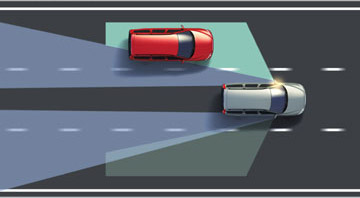 ¿Ha reaccionado de una forma en la cual se sorprendió hasta usted mismo?
¿Ha reaccionado de una forma en la cual se sorprendió hasta usted mismo?
 Reaccionar: Uso de un área dominante del pensamiento. Es el impulso que nos protege cuando hay peligro y se dispara inconscientemente.
Reaccionar: Uso de un área dominante del pensamiento. Es el impulso que nos protege cuando hay peligro y se dispara inconscientemente.
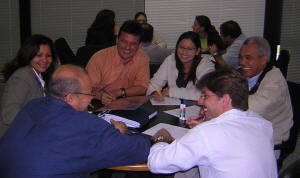
 We all think about the nature of time. The Latin phrase Carpe Diem (seize the day) has become part of our vocabulary. The essence of time took on particular significance recently when I decided to wait until the following day to take a photo of a spectacular flower.
We all think about the nature of time. The Latin phrase Carpe Diem (seize the day) has become part of our vocabulary. The essence of time took on particular significance recently when I decided to wait until the following day to take a photo of a spectacular flower.
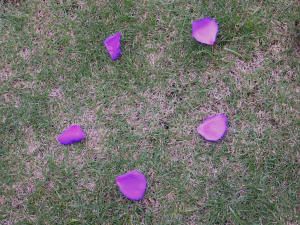 Deception upon waking and having found
Deception upon waking and having found Apremiamos a las personas que son eficientes. Desde una edad temprana, aprendemos a hacer las cosas bien hechas. Hay una presión palpable en nuestra sociedad para ser “perfectos”. La perfección es una cualidad loable y debemos buscar mejorarnos en cada momento. Aún así, la perfección en sí a través de la eficiencia extrema podría ser un arma de doble filo. Vale la pena reflexionar:
Apremiamos a las personas que son eficientes. Desde una edad temprana, aprendemos a hacer las cosas bien hechas. Hay una presión palpable en nuestra sociedad para ser “perfectos”. La perfección es una cualidad loable y debemos buscar mejorarnos en cada momento. Aún así, la perfección en sí a través de la eficiencia extrema podría ser un arma de doble filo. Vale la pena reflexionar: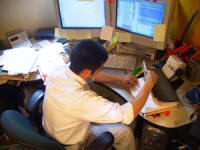
 Ahora, supongamos que tomemos 10 minutos al finalizar cada día para realizar una lista de tareas para o día siguiente. Este hábito es muy “eficiente” mas no necesariamente “eficaz”. Las tareas que solemos colocar en nuestra lista son las que son urgentes y normalmente “tienen” que ser hechas, no necesariamente las más importantes que “deben” ser hechas.
Ahora, supongamos que tomemos 10 minutos al finalizar cada día para realizar una lista de tareas para o día siguiente. Este hábito es muy “eficiente” mas no necesariamente “eficaz”. Las tareas que solemos colocar en nuestra lista son las que son urgentes y normalmente “tienen” que ser hechas, no necesariamente las más importantes que “deben” ser hechas.